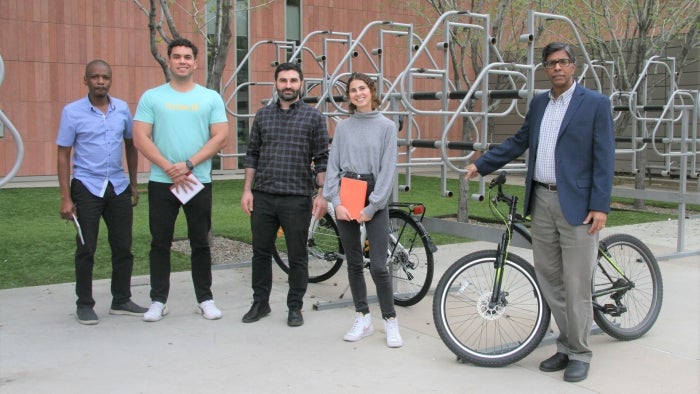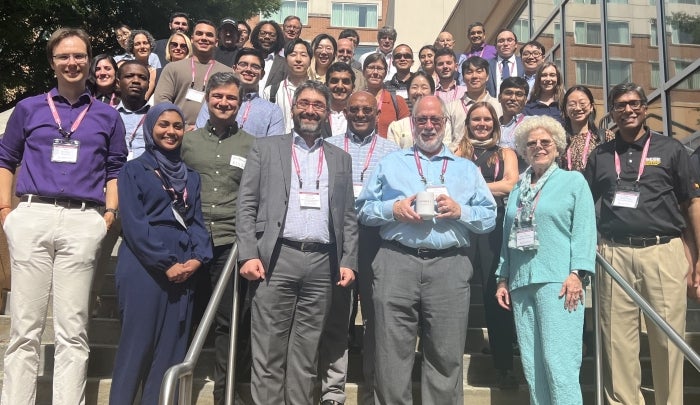ASU travel behavior research center provides insights on the future of transportation

The TOMNET Center consortium, led by Arizona State University, has developed four key products that include data dashboards to share information about how people spend their time, how travel behavior has evolved and people’s sense of well-being. Survey results from TOMNET provide insights into use of emerging mobility technologies and how the pandemic impacted travel behavior. Image courtesy of TOMNET
The Center for Teaching Old Models New Tricks, known as TOMNET, has spent the past seven years conducting research and developing tools to improve transportation systems planning methods and data.
As the center’s grant term ends, it is releasing its tools, datasets and dashboards to increase understanding of changes in travel behavior, identify factors that impact travel demand and influence policy decisions and investments.
TOMNET is one of several grant-supported U.S. Department of Transportation (DOT) Tier 1 University Transportation Centers, funded by the Fixing America’s Surface Transportation Act, that conduct research on complex transportation issues and advance workforce development. The TOMNET consortium is comprised of Arizona State University, which leads the team, Georgia Institute of Technology, University of South Florida and University of Washington.
Consortium researchers collaborated on projects to advance knowledge and methods that help transportation professionals and the public better understand and forecast travel demand. They have done this by including data on people’s attitudes, perceptions and preferences about transportation in statistical models commonly used for forecasting.
During the grant, TOMNET completed 60 research projects, generated dozens of publications, conducted more than 50 webinars and built a web presence with many resources, seminar recordings and presentations to share findings. In addition, the center provided opportunities for transdisciplinary collaborations, built networks and disseminated results, says Steven E. Polzin, a research professor with the TOMNET Center in the School of Sustainable Engineering and the Built Environment, part of the Ira A. Fulton Schools of Engineering at ASU.
“The TOMNET University Transportation Center has not only pioneered the development of innovative data and tools for transportation planning and analysis, but has also nurtured a generation of skilled professionals who will continue to drive the future of mobility,” says Ram Pendyala, TOMNET center director and director of the School of Sustainable Engineering and the Built Environment. “Its legacy is one of transformative impact and unwavering dedication to creating new knowledge, datasets, analytics, modeling tools and dashboards for advancing sustainable and equitable transportation systems for a better tomorrow.”
The TOMNET team at ASU will continue its work through the National Center for Understanding Future Travel Behavior and Demand, led by The University of Texas at Austin and funded through the DOT’s most recent grant cycle, says Irfan Batur, assistant director of TOMNET and a research assistant professor in the School of Sustainable Engineering and the Built Environment.
4 key products benefit community
TOMNET developed open-source tools and dashboards to aid planners in designing future transportation systems.
“Our focus is on understanding people’s mobility choices, attitudes, perceptions, lifestyle preferences and how they are impacted by disruptive and transformative forces in the transportation landscape, including technological advances such as autonomous vehicles, the response to pandemics and extreme weather events,” Batur says.
TOMNET’s four key products help the community understand the dynamics of travel behavior, activity and mobility choices and provide valuable, timely and customizable information, Batur says.
TOMNET’s Time Use, Travel, and Telework Dashboard offers insights into how people spend their time and how travel and telecommuting patterns evolve. Using data from the American Time Use Survey, the dashboard presents detailed information on changing time use patterns. These insights interest transportation professionals and are also valuable to public health, urban planning, social welfare, labor economics and time geography.
The TOMNET well-being platform provides information about trends in people’s sense of well-being stemming from daily time use and activity/mobility patterns. It helps identify inequities by automatically calculating and plotting trends in activity-travel well-being of different populations.
The TOMNET Transformative Transportation Technologies Survey offers in-depth data on the potential impacts of emerging mobility technologies on choices, traveler behavior and values, helping to shape a more sustainable and equitable future mobility landscape. The dataset includes nearly 3,500 survey responses from four major Sunbelt metropolitan areas.
TOMNET’s COVID Future Survey provides critical data on the pandemic’s impact on travel behavior, enabling the formulation of policies to meet diverse groups’ mobility needs. This dataset with nearly 10,000 observations was used by planners to update transportation demand models to develop more accurate forecasts. TOMNET Associate Director Deborah Salon, an associate professor in the ASU School of Geographical Sciences and Urban Planning, served as lead principal investigator for this study.
“The widely shared results from TOMNET’s COVID Future Survey indicated both short-term and long-term consequences associated with the pandemic and its aftermath,” Polzin says. “We have been witnessing dramatic changes in travel behavior over the duration of the grant due to the rapid evolution of technology and the pandemic’s impact.”
The timely research on COVID-19 impacts received substantial attention and praise from the research and policy communities.
TOMNET’s four key products guide practitioners and policymakers to develop more equitable, efficient and sustainable transportation systems that enhance societal well-being, Batur says.
“We made our survey data available to the public to increase its reach and help communities even beyond the transportation field. Our online tools are open source, and we provide the source code and pre-processed datasets to anyone interested in using them,” Batur says. “These tools are designed to be easy to maintain, allowing us to update them rapidly with minimal effort to incorporate new data releases.”
Enhanced understanding of travel behavior and how it evolves helps shape transportation policy and investment decisions, Polzin says.
“Insights provided by TOMNET products allow us to identify pockets of inequities in transportation systems and develop solutions to address them, as well as identify potential areas for enhancing the sustainability of our transportation systems and mitigating their environmental impacts,” Batur says.
The reputation of ASU and the School of Sustainable Engineering and the Built Environment was important in securing funding and carrying out research, obtaining matching funds, complying with federal grant requirements and disseminating results, Polzin says.
“Transportation is increasingly interdisciplinary and the breadth of talent available at ASU makes it possible to call on colleagues with relevant knowledge to address diverse research challenges,” Polzin says.
Developing the next-generation workforce
Beyond conducting research, TOMNET provides support for students, growing the pipeline of future transportation professionals.
“Dozens of students at ASU and TOMNET consortium partners benefited from financial support for their studies and the opportunity to work closely with faculty members to hone their research skills and overall knowledge about transportation,” Polzin says. “Producing the next generation of highly skilled professionals is a critical need for transportation.”
Students also benefited from opportunities to present research, learn more about developments in the sector and network with students and professionals at events, including the Annual Meetings of the Transportation Research Board.
In May 2024, the TOMNET Grand Finale Event brought together members, graduate students, center alumni, federal representatives and transportation professionals to showcase TOMNET’s products at Georgia Tech.
What’s next?
In August, ASU TOMNET researchers will present findings to stakeholders including legislative and executive branch representatives at a forum on the future of transportation hosted by DOT in Washington, D.C.
ASU’s participation in the new National Center for Understanding Future Travel Behavior and Demand reflects the talent at ASU and the widespread recognition of travel behavior’s importance, Polzin says.
“The ASU team now looks forward to continuing groundbreaking research in this topical area for an additional five years,” Polzin says.
More Science and technology

Hack like you 'meme' it
What do pepperoni pizza, cat memes and an online dojo have in common?It turns out, these are all essential elements of a great cybersecurity hacking competition.And experts at Arizona State…

ASU professor breeds new tomato variety, the 'Desert Dew'
In an era defined by climate volatility and resource scarcity, researchers are developing crops that can survive — and thrive — under pressure.One such innovation is the newly released tomato variety…

Science meets play: ASU researcher makes developmental science hands-on for families
On a Friday morning at the Edna Vihel Arts Center in Tempe, toddlers dip paint brushes into bright colors, decorating paper fish. Nearby, children chase bubbles and move to music, while…





